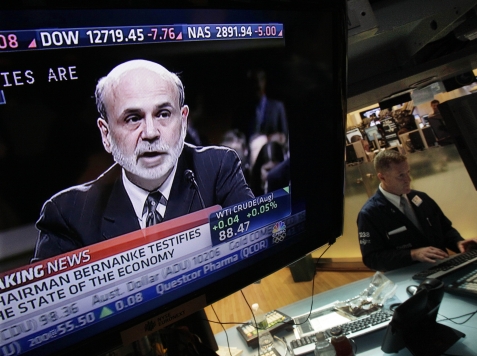
You don’t get something for nothing
You can’t have freedom for free
You won’t get wise
With the sleep still in your eyes
No matter what your dreams might be
Rush: Geddy Lee, Neil Peart
This past Friday, watching Federal Reserve Board Chairman Ben Bernanke laugh his way through what is likely to be his last press conference as a Fed official, we ought to be reminded of the numerous times that President Herbert Hoover called the economic recovery. “Prosperity is just around the corner” is what he said to businessmen in 1932 when things were just about to get a lot worse.
Bernanke says that he and the other members of the Federal Open Market Committee were worried about deflation until the central bank started to purchase tens of billions of dollars in bonds via “quantitative easing” a couple of years ago. Trouble is that the Fed’s low interest rate regime is now accelerating deflation even as the FOMC begins to “taper” its bond purchases. The FOMC is actually making things worse.
The only way to arrest the growing deflationary tendency in the major industrial nations is to raise interest rates, but none of the demand side socialists who inhabit the FOMC are even capable of considering such concepts. The latest salvo against the mindless idiocy of the socialist crowd comes from the International Monetary Fund, which predicts that the debt holders of the major industrial nations will take even more losses — this on top of the financial repression of low interest rates over the past five years.
Meanwhile, if this were not enough good news, J. Bradford DeLong is Professor of Economics at the University of California at Berkeley and a research associate at the National Bureau of Economic Research, predicts in a comment on Project Syndicate that the impact of the economic crisis will actually be worse than that suffered during the Great Depression. DeLong, who was Deputy Assistant US Treasury Secretary during the Clinton Administration, notes correctly that the lost spending and employment – all as a result of the anti-growth policies of the Obama Administration – will add up to something approximating ten years of total economic output lost. Says DeLong:
That is a higher share of America’s productive capabilities than the Great Depression subtracted – and the US economy is 16 times larger than it was in 1928 (5.5 times larger in per capita terms). So, unless something – and it will need to be something major – returns the US to its pre-2008 growth trajectory, future economic historians will not regard the Great Depression as the worst business-cycle disaster of the industrial age. It is we who are living in their worst case.
Like many liberals, DeLong bemoans the fact that the bottom 90% are losing ground in terms of income and economic possibilities even as the top 10% are continuing to see their incomes rise. He notes: “But, for everyone else – roughly 90% of the US population – there has been no jump in income share relative to ten or 20 years ago to offset what now looks to be a permanent lost decade. On the contrary, the bottom 90% has continued to lose ground.”
The trouble is that none of the policy makers in Washington have any interest in taking steps to revitalize growth in the US economy. DeLong asks: “One would think that America’s leaders would be clambering to formulate policies aimed at returning the economy to its pre-2008 growth path: putting people back to work, cleaning up underwater mortgages, restoring financial markets’ risk-bearing capacity, and boosting investment.” Ditto. I have been saying just that for the past five years.
The biggest obstacle to economic recovery is ignorance, among the public and in Congress. Even reasonable proposals like those advanced by DeLong are basically frozen out by the strange logic that currently holds sway inside the White House and within the FOMC. In both cases, the idea of real debt restructuring and economic revival is shunned in favor of policy stasis and financial repression. The current policy mix includes restricting consumer access to credit, punishing savers with low interest rates and subsidizing debtors and big banks with massive inflation. How much more regressive could US economic policy possibly be?
Income inequality is growing in the US because our leaders understand nothing about encouraging growth and jobs. Liberals should stop fretting about “income inequality” and start to encourage growth. As the recovery in the housing sector fades in 2014, just remember the words of President Hoover when you think of the Fed and the fantasy land economy policies of the Obama Administration: Recovery is just around the corner.

COMMENTS
Please let us know if you're having issues with commenting.